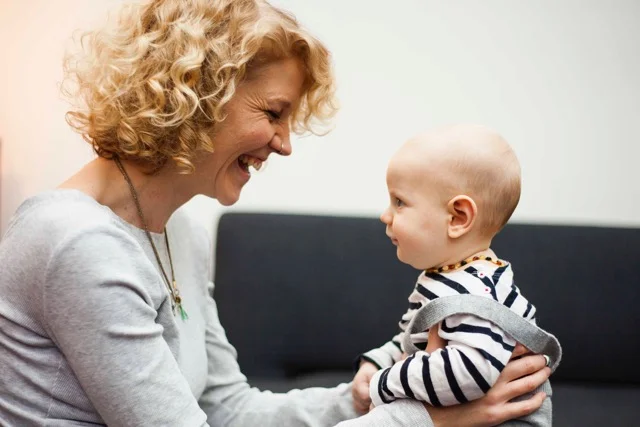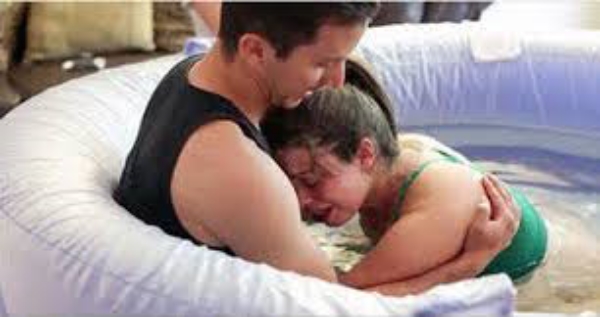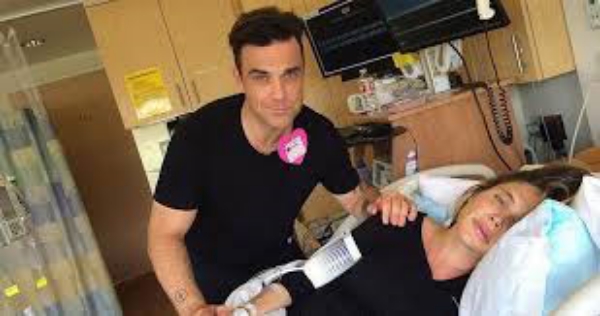Do men bring drama to the birth room?
The ubiquitous Michel Odent famously, in his characteristically provocative fashion, once said that father’s should not be allowed into the birthing room.
The radical, french obstetrician, well known for his discourse on the medicalisation, ‘modernisation,’ and masculinisation of childbirth, is no stranger to causing a stir in the boho-maman-bébé circles. However, unlike some of his other revolutionary ideas, this particular little nugget of wisdom didn’t quite seem to catch on.
Perhaps this was due to the fact that the childbirth Guru is, himself, a man and there was a subtle sense of irony in this implication that he was the only male fit to be present in the birth environment [At times we would be forgiven for thinking that Odent is actually a women, or some kind of born-again misandrist that woke up one day and found himself with a penis].
None-the-less, I am in fact a big fan of many of Odent's ideas, and his argument about men bringing unnecessary noise, drama, anxiety and adrenaline to the birthing room was rooted in, and cohesive with, his ideas about stress hormones, and the overstimulation of the ‘thinking’ brain, fundamentally inhibiting and disturbing the birth process.
We only have to look at the clip of Robbie Williams serenading his unimpressed wife, as she attempts to give birth to their baby, or watch a clip of One Born Every Minute, to see that the male presence in the birth room is not always helpful.
And whilst it doesn't necessarily follow that all men bring drama to the birth room, I can’t help but think that there is at least some element of truth, in Odent’s claims here.
The blurring of gender roles
Part of living in this, our post-modern times is the perpetual definition and re-definition of our gender roles. The current ‘trans’ debate, for instance is blurring the boundaries of what we see and think of as distinctively ‘male’ and ‘female’ roles.
Thus, this new-found fluidity, between what we once saw as typically male or female characteristics or tendencies; the mothering female: empathiser, carer, nurturer, Versus the He-man hunter gatherer figure: scientific, rational, material provider, perhaps goes part of the way to explain the wake of men busting into the birth room.
Historically, and anthropologically, we know that birth has been a traditionally female domain. And the fact that most father’s in the UK now attend the birth should, rightly, be situated within it’s own historical and cultural context.
Whilst we have come to see this model as the norm here in the UK (93% of men are involved to some extent), it is in fact a relatively new, and culturally specific phenomenon.
Dr Laura King, is a social historian at the University of Leeds, who completed her PhD in fatherhood in early modern Britain. She situates the rise of fathers accompanying their wives, from the 1950’s onwards, within the context of the movement of birth from the home to the hospital.
« Away from the familiar surroundings of the home, women looked to a birthing partner for more moral support and men started to play an increasing role. »
The emergence of the 'modern man'
The ‘rise’ of the modern man presents us with a new, and curious creature, who frequently sees his ‘mate’ quite literally as his best pal, and decides to embark upon all that she does, and experiences, in a kind of symbiotic, mutual journey.
I have witnessed many a specimen of this new modern man: in touch with his emotions, embodying and embracing everything from hypnobirthing visualisations, “think of the lotus flower baby; open like a lotus flower,” to furrowing through the Bach flower remedies manual to find the best potion for his Missus’ present ailment.
But whilst many men are all too willing to get down and dirty with birth, there are still those who prefer to stay well away, maintaining that birth is a female domain. Some feel simply too squeemish about the whole gory process, whilst others are concerned about the impact that getting up-close and personal during birth will have on their future romantic relationship.
On both sides of the channel we have seen prominent male figures declare their distain for the male presence at birth. The ever-outspoken Gordon Ramsey, cooked up a fuss when he publically, and unapologetically, announced that he did not attend the births of any of his four children. Expressing particular concern over the repercussions this would have on his sex life he commented:
“Seeing a woman in distress, screaming at the top of her voice, pushing, pushing, pushing, and sweat, sweat, sweat? I'd rather be stark bollock naked in a steam room with 50 vegans."
Across the channel, the prominent French Sailor Olivier de Kersauson was equally unapologetic when he declared: « birth is women’s business ; it is not men’s business.» Being a french man, he chose to elaborate this belief by using the analogy of a roman temple, in which males and females are like columns: a certain amount of distance and separation must be maintained, for the continued stability and equilibrium of the whole....
La maternité est une affaire de femme. Pas une affaire d'homme. Dans les Ecritures, on présente l'enfant au père une semaine après l'accouchement. Les colonnes du temple, quand elles sont trop rapprochées, ne soutiennent rien. Un homme et une femme doivent être suffisamment séparés pour pouvoir soutenir quelque chose, une construction. [...]
Whereas the above may well represent extreme examples, the British pregnancy advisory service estimates that one in 20 fathers still avoids being present when their partner gives birth.
Often chastised for being unsupportive, or selfish, should men who feel truly uncomfortable with the process, or that it is not their domain, be given a bit of slack?
Is birth still a female space?
There is also the bigger question of how useful Men actually are at what we traditionally consider female roles. A Telegraph article last week highlighted the increasing number of women who are now choosing to have their Mother in Laws (‘MIL’s’) present at their birth. This idea of an experienced female figure, who has had their own children, being well equipped to provide emotional support, is also the premise behind the rise of the Doulas.
Experienced doulas have often undergone several training courses and attended hundreds of births, and many have also had children of their own. Such experience means that they can anticipate the needs of the labouring woman and provide reassurance and guidance. Can we really expect men, who have no previous experience, to do a crash course in birth support and meet these needs equally well?
And are we putting too much pressure on men to fulfil this role, which does not always come naturally to them? Un-practised, and un-experienced, subject to their own anxieties about their own transition into parenthood, men now experience the additional social pressures of becoming birth and breastfeeding wizards in the space of 9 months.
Of course there will be some men who are very excited to embark upon this journey, and extremely dexterous at it. But for those who aren’t so keen, should we be more lenient, and willing, to let them duck out?
On several occasions I have heard of women being disappointed with the support they received from their partners during birth, wishing instead that they had chosen to have a more experienced and calming female figure supporting them during this emotionally and physically taxing time. I cannot speculate on the impact this has on their relationships, but one would assume that that these feelings of dissatisfaction and inadequacy, feelings of letting-down or being let down by your loved one, during this important time, pose potential negative consequences.
Rad-dads, such as Dean Beaumont, author of the Expectant Dad’s handbook, equally adds that for those fathers that are keen to participate, health professionals need to do more to welcome and involve fathers, in order to enable Dads to feel more comfortable and willing, about their role in the birth room.
As with everything to do with childbirth, the matter ultimately boils down to personal choice. However, given that what we now assume as ‘the norm,’ is in fact only 60 years young, perhaps we should be more open and reflective upon the potential disadvantages, as well as advantages, of having fathers in the birthing room. It cannot be assumed that the father attending the birth, is, necessarily, the best outcome for all couples. Given that this is such a recent phenomenon in human history, we cannot yet say, with any conviction, what effect the presence of the father at birth will have on a whole range of social phenomena, including romantic and intimate relationships.


